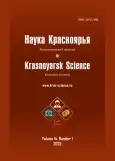Analysis of strategic planning and forecasting approaches used in the transport industry of the Russian Federation
- Authors: Trepashova E.B.1
-
Affiliations:
- Russian University of Transport
- Issue: Vol 14, No 1 (2025)
- Pages: 109-134
- Section: Articles
- Published: 31.03.2025
- URL: https://journal-vniispk.ru/2070-7568/article/view/303390
- DOI: https://doi.org/10.12731/2070-7568-2025-14-1-287
- EDN: https://elibrary.ru/WARMYK
- ID: 303390
Cite item
Full Text
Abstract
This article is aimed at analyzing strategic management in the development of the Russian transport system in order to form an understanding of current approaches and planning and implementation tools for the possibility of developing new approaches to improve the effectiveness of management in the industry. The relevance of the article lies in the fact that modernity is characterized by uncertainty and variability of economic processes, and the transport system plays a key role in the development of any country, especially such an extensive one as Russia.
Purpose. Identification of approaches and techniques of strategic management used in the transport industry.
Methodology. The article used economic and mathematical methods, as well as statistical methods of analysis.
Results. The most informative parameters have been obtained, showing some aspects of the analysis of strategic planning tools in the transport industry.
Practical implications. It is advisable to apply the results obtained by subjects engaged in activities in the field of transport planning and economics.
About the authors
Elvira B. Trepashova
Russian University of Transport
Author for correspondence.
Email: a.elvira.2503@gmail.com
Postgraduate student of the Department of Psychology, Sociology, State and Municipal Management at the Institute of Economics and Finance
Russian Federation, 9/9, Obraztsova Str., Moscow, 127994, Russian Federation
References
- President of the Russian Federation Decree No. 309 dated May 7, 2024. On National Goals for the Development of the Russian Federation until 2030 and Prospective up to 2036.
- President of the Russian Federation Decree No. 474 dated July 21, 2020. On Objectives for the Development of the Russian Federation until 2030.
- President of the Russian Federation Decree No. 596 dated May 7, 2012. On Long-Term State Economic Policy.
- President of the Russian Federation Decree No. 601 dated May 7, 2012. On Main Directions for Improving the System of Public Administration.
- Government Resolution of the Russian Federation No. 1234 dated November 14, 2015. On Procedure for Developing, Adjusting, Monitoring, and Controlling Implementation of Medium-term Forecast of Socio-economic Development of the Russian Federation and on Recognition of Certain Acts of the Government of the Russian Federation as Invalid.
- Government Resolution of the Russian Federation No. 1596 dated December 20, 2017. On Approval of the State Program of the Russian Federation “Development of Transport Infrastructure”.
- Government Resolution of the Russian Federation No. 304 dated April 15, 2014. On Approval of the State Program of the Russian Federation “Development of Shipbuilding Industry for 2013–2030”.
- Government Order of the Russian Federation No. 3363-r dated November 27, 2021. On Transport Strategy of the Russian Federation until 2030 with Outlook until 2035.
- Government Resolution of the Russian Federation No. 1243 dated October 12, 2017. On Implementation of Measures of Federal Target Programs Integrated into Separate State Programs of the Russian Federation.
- Government Resolution of the Russian Federation No. 395 dated July 30, 2004. On Approval of Regulations on Ministry of Transport of the Russian Federation.
- Order of the Ministry of Economic Development of Russia No. 423 dated June 30, 2016. On Approval of Guidelines for Preparation, Correction, and Monitoring of Medium-term Forecast of Socio-economic Development of the Russian Federation and on Revocation of Order of the Ministry of Economic Development of Russia No. 492 dated November 30, 2009.
- Makarov, O. N. (2024). Institutional-economic justification of multi-agent role of transport industry in macro-system development. Problems of Market Economy, (2), 98–106. https://doi.org/10.33051/2500-2325-2024-2-98-106
- Makarov, O. N., Abduriahimova, E. B. (2024). Contemporary Multi-Agent Transportation Systems: Impact on Cultural Capital, Economy, and Digital Transformation. Krasnoyarsk Science: Economic Journal, 13(2), 55–71. https://doi.org/10.12731/2070-7568-2024-13-2-246
- Makarov, S. A., Narzhannaya, N. Y., Safronov, E. G. (2024). Stages of Risk Management Process in Enterprise Quality Management System. Economics and Entrepreneurship, (3), 1307–1310. https://doi.org/10.34925/EIP.2024.164.3.254
- Makarov, I. N., Drobot, E. V., Grafov, A. V., Evsin, M. Y., Pivovarova, O. V. (2022). Transformation of institutional foundations and mechanisms of economic policy as a factor of import substitution in Russia under sanctions pressure and external trade threats. Economic Relations, 12(4), 651–670. https://doi.org/10.18334/eo.12.4.116909
- Makarov, O. N., Abduriahimova, E. B., Dyakova, P. S. (2024). Justification of decision-making in transport policy based on multi-agent approach (case study of Russia’s transport strategy). Krasnoyarsk Science: Economic Journal, 13(3), 131–150. https://doi.org/10.12731/2070-7568-2024-13-3-253
- Awasthi, A., & Omrani, H. (2018). A goal-oriented approach based on fuzzy axiomatic design for sustainable mobility project selection. International Journal of Systems Science: Operations & Logistics, 6(1), 86–98. https://doi.org/10.1080/23302674.2018.1435834
- Beukers, E., Bertolini, L., & te Brommelstroet, M. (2021). Why cost-benefit analysis is perceived as a problematic tool for assessment of transport plans: A process perspective. Transportation Research Part A: Policy and Practice, 46(1), 68–78. https://doi.org/10.1016/j.tra.2011.09.004
- Huang, X. (2023). A review of multicriteria decision-making methods in transport planning: Applications and future directions. Transportation Research Part II: Transport and Environment,115.
- Kahneman, D., & Tversky, A. (1982). The simulation heuristic. In D. Kahneman, P. Slovic, & A. Tversky (Eds.), Judgment Under Uncertainty: Heuristics and Biases (pp. 201–208). Cambridge University Press. https://doi.org/10.1017/CBO9780511809477.015
- Kheirandish, R., & Mousavi, S. (2018). Herbert Simon, innovation, and heuristics. Mind & Society, 17, 97–109. https://doi.org/10.1007/s11299-019-00203-6
Supplementary files










